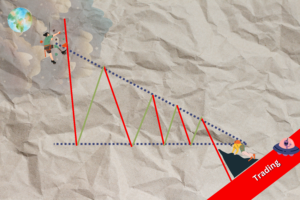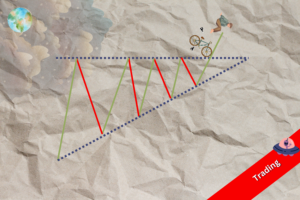The second triangle: the Descending Triangle
Read MoreThe Impact of Geopolitical Events on Investment Decisions
How geopolitical events affect market participants

In an increasingly interconnected and globalized world, geopolitical events profoundly impact financial markets and investment decisions. These events can range from international conflicts and trade disputes to political instability and regulatory changes. Understanding how geopolitical events affect investments is crucial for investors to make informed decisions and manage risks effectively.
Geopolitical events are inherently uncertain, and their outcomes can be difficult to predict. However, by examining historical patterns and understanding the key factors at play, investors can better prepare themselves for the challenges and opportunities that arise in the wake of such events. This article explores the impact of geopolitical events on investment decisions and provides insights into strategies investors can employ to navigate these uncertainties.
The Nature of Geopolitical Events
Geopolitical events encompass a wide range of situations, and they can be broadly categorized into the following:
International Conflicts: Armed conflicts or tensions between nations, such as wars or territorial disputes.
Trade Disputes: Trade wars, tariffs, and sanctions that can disrupt global trade and economic relationships.
Political Instability: Events like elections, coups, and regime changes can introduce uncertainty to a country’s policies and alliances.
Terrorism and Security Concerns: Acts of terrorism and security threats that can disrupt markets and investor confidence.
Regulatory Changes: Alterations to government regulations and policies, including tax laws and industry-specific regulations, which can impact various sectors.
The Impact of Geopolitical Events on Investments

1. Market Volatility
Geopolitical events often lead to increased market volatility. Investors react to uncertainty by adjusting their portfolios, causing price swings in stocks, bonds, and commodities. For example, during a geopolitical crisis, equity markets may experience sharp declines. At the same time, safe-haven assets like gold and government bonds tend to rise in value as investors seek refuge from risk.
2. Sector-Specific Effects
Different industries and sectors are impacted in varying ways by geopolitical events. For instance, defense and cybersecurity companies may benefit from increased defense spending in times of conflict, while tourism and transportation sectors can suffer due to security concerns. Energy markets are particularly sensitive to geopolitical tensions, as disruptions in oil and gas supply can lead to significant price fluctuations.
3. Currency Markets
Currency markets are highly sensitive to geopolitical events, as changes in a country’s political stability or trade relations can impact its currency’s value. Investors may flock to safe-haven currencies like the U.S. dollar or the Swiss franc during times of uncertainty, while currencies in countries directly affected by the event may weaken.
4. Commodity Prices
Geopolitical events can disrupt the production and transportation of commodities, affecting their prices. For example, a conflict in a major oil-producing region can lead to supply disruptions and subsequent price spikes in the global oil market. Investors with exposure to commodities like oil, metals, and agricultural products should closely monitor these events.
Strategies for Navigating Geopolitical Uncertainty

1. Diversification
Diversification is a fundamental strategy for mitigating the impact of geopolitical events on an investment portfolio. By spreading investments across various asset classes, sectors, and geographic regions, investors can reduce the risk associated with a single geopolitical event. Diversified portfolios are generally better equipped to weather market turbulence.
2. Long-Term Perspective
Investors with long-term goals may choose to ride out the storm during geopolitical events. While there may be short-term market disruptions, financial markets have historically shown resilience over the long run. Taking a long-term perspective can help investors avoid impulsive decisions based on short-term uncertainty.
3. Risk Management
Implementing risk management techniques is crucial during geopolitical uncertainty. Stop-loss orders, for example, can automatically sell an asset if its price falls below a specified level, limiting potential losses. Hedging strategies, like using options or futures contracts, can also be employed to protect against adverse price movements.
4. Safe-Haven Assets
During times of geopolitical turmoil, safe-haven assets such as gold, government bonds, and precious metals tend to perform well. These assets can provide stability and act as a hedge against market volatility. Investors should consider including a portion of these assets in their portfolios to offset potential losses in riskier investments.
5. Stay Informed
Continuous monitoring of geopolitical events and their potential impact on investments is essential. Investors should keep themselves updated with reliable news sources, market analysis, and geopolitical experts. Being informed enables investors to make timely and well-informed decisions.
Case Studies

To illustrate the impact of geopolitical events on investments, let’s consider some recent and significant examples:
The Palestine-Israel Conflict
The price of gold has risen due to the recent escalation of the Palestine-Israel conflict. Financial markets are closely monitoring this conflict for any signs of worsening, and if oil prices continue to rise, there are concerns about increased inflation. Unfortunately, this comes at a time when many countries were starting to see a slowdown in inflation after two years of consistently high consumer prices.
The U.S.-China Trade War
The trade tensions between the United States and China, marked by tariffs and trade negotiations, have had far-reaching effects on global markets. During the height of the trade war, equity markets experienced increased volatility, with sectors like technology and manufacturing being particularly affected. Investors sought safety in government bonds and gold. The uncertainty surrounding the trade war also influenced corporate strategies, with some companies shifting supply chains and adjusting their business plans.
Brexit
The United Kingdom’s decision to leave the European Union, known as Brexit, created substantial uncertainty for investors. The value of the British pound fluctuated significantly, and the FTSE 100 index saw both gains and losses. Industries heavily reliant on EU trade, such as automotive and financial services, faced unique challenges. Investors with exposure to UK assets had to adapt their strategies and consider the potential outcomes of the negotiations.
Bottom Line
Geopolitical events are an inherent part of the global landscape, and they play a significant role in shaping investment decisions. While these events introduce uncertainty, investors can navigate them successfully by employing strategies like diversification, maintaining a long-term perspective, implementing risk management techniques, and including safe-haven assets in their portfolios.
Staying informed and monitoring developments is crucial for making informed investment decisions. By understanding the nature of geopolitical events and their impacts, investors can better position themselves to adapt and thrive in a rapidly changing world.
The key takeaways/market update is a series by AxeHedge, which serves as an initiative to bring compact and informative In/Visible Talks recaps/takeaways on leading brands and investment events happening around the globe.
Do keep an eye out for our posts by subscribing to our channel and social media.
None of the material above or on our website is to be construed as a solicitation, recommendation or offer to buy or sell any security, financial product or instrument. Investors should carefully consider if the security and/or product is suitable for them in view of their entire investment portfolio. All investing involves risks, including the possible loss of money invested, and past performance does not guarantee future performance.
Trading Dow Pattern the Triangle Pattern (Part 1)
The first triangle: the Ascending Triangle
Read MoreFunds: Equity Funds (Part 3)
How to choose between equity funds based on companies’ earnings...
Read More



